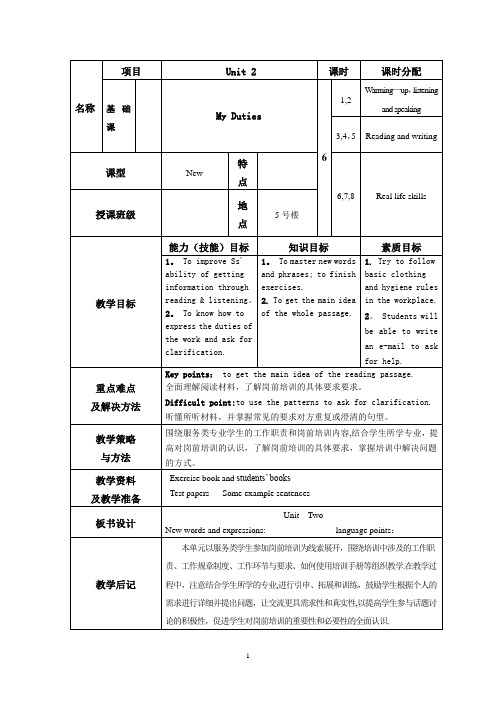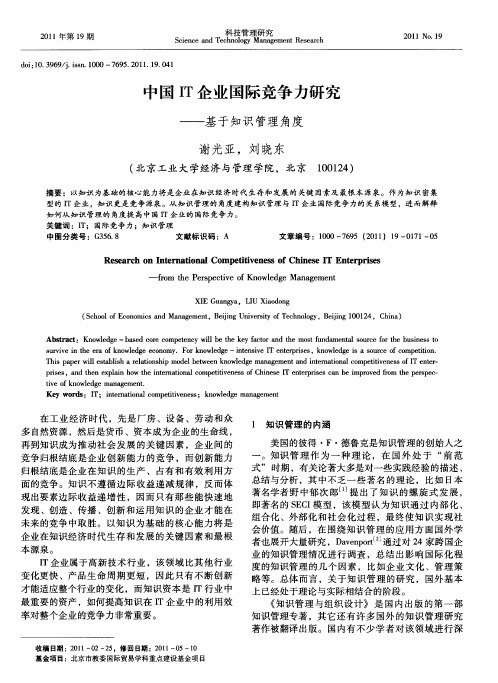KS in knowledge intensive companny
- 格式:pdf
- 大小:888.32 KB
- 文档页数:9

知识用英语怎么写Knowledge is an important aspect of life. It refers to the facts, information, and skills acquired through education, experience, and exposure. Intoday's information age, knowledge has become more accessible than ever before, with the advent of the internet and other communication technologies. It is widely acknowledged that knowledge is power, and it can provide individuals and societies with a competitive advantage in various domains.There are several forms of knowledge, including theoretical knowledge, practical knowledge, experiential knowledge, and intuitive knowledge. Theoretical knowledge refers to the understanding of concepts and theories, usually obtained through education and research. Practical knowledge, on the other hand, is the mastery of skills and techniques required to perform specific tasks, such as cooking, driving, or carpentry. Experiential knowledge is gained through personal experience, while intuitive knowledge is based on instincts, intuition, and hunches.Knowledge is often categorized into different disciplines, such as science, mathematics, literature,history, and philosophy. Each discipline has its own body of knowledge, theories, methods, and approaches, and contributes to the development of human understanding and advancement. For instance, science is concerned with the study of the natural world, while literature explores human emotions and experiences. History examines past events and their causes, while philosophy tackles fundamental questions about existence, morality, and knowledge itself.The acquisition and dissemination of knowledge have undergone significant changes over time, fromoral traditions and manuscripts to printed books and digital media. The invention of printing by Johannes Gutenberg in the 15th century revolutionized the spread of knowledge, allowing for the mass production and distribution of books and other printed materials. In the 21st century, the internet has become the main source of knowledge and information for many people, with millions of websites, blogs, and online forums offering a vast array of resources and perspectives.However, the abundance of information can also pose challenges, such as the difficulty of verifying sources, the risk of misinformation and fake news, and the overwhelming nature of the sheer volume of data available. Therefore, it is important for individuals to develop critical thinking skills and the ability to evaluate and analyze information, as well as to seekout diverse and reliable sources of knowledge.The importance of knowledge is evident in various aspects of life, from personal development and career success to societal progress and global challenges. Knowledge empowers individuals to make informed decisions, solve problems, express creativity, and pursue their passions. It also enables societies to address complex issues, such as poverty, inequality, climate change, and health crises, through innovation, collaboration, and evidence-based solutions.In conclusion, knowledge is a vital and complex concept that plays a crucial role in human life and society. It encompasses various forms, disciplines, and sources, and requires ongoing learning, critical thinking, and open-mindedness. As the world continues to evolve and face new challenges, knowledge remains a powerful tool for individuals and communities to navigate and thrive in an ever-changing environment.。

★In that case, there is nothing you can do ______ than wait。
A。
more B。
other C。
better D。
any答案为B。
一、“other than”的含义1.other than = except, but, apart from “除……以外”There is nobody here other than me. 这里除了我以外没有别人.Someone other than your brother should be appointed manager。
应当任命一个除了兄弟之外的人当经理。
2。
other than = besides “除……以外,还……”English is now spoken in many countries other than England。
除英国外,其他许多国家都讲英语。
There were three people at the meeting other than Mr Day. 除戴先生以外,还有三个人参加了会议.3.other than = not,instead of,rather than “不、非、而不是”I borrowed some books other than novels. 我借了几本书,都不是小说书。
4.other than = in any other way than “用除此以外别的方式”You can't get there other than by swimming。
除了游过去之外,你没有别的方法到达那儿。
二、“other than"的结构1.other than + 名词/代词The presence of elements other than iron greatly affects the physical properties of steel.铁以外的其他元素的存在极大地影响着钢的性能。

知识管理的重要性(英文)
张颉
【期刊名称】《中国外资》
【年(卷),期】2011(000)014
【摘要】知识管理是一种迅速发展的、由内部产生的无形资产资源,在公司价值评估方面起到了十分重要的作用。
本文深入强化了知识管理的概念,并且强调了知识管理作为一种重要商业战略对组织的重要性。
【总页数】1页(P138-138)
【作者】张颉
【作者单位】上海商学院
【正文语种】中文
【中图分类】F273.4
【相关文献】
1.基于英文文献的知识管理绩效评估研究r——评估动因、评估模型和评估方法分析 [J], 吴国娇;孙嘉睿
2.论知识型政府农业知识管理系统的构建(英文) [J], 明辉
3.搞好企业知识管理提高企业核心竞争能力——浅析企业知识管理的重要性 [J], 张红科
4.基于英文文献的知识管理绩效评估研究——评估动因、评估模型和评估方法分析[J], 吴国娇; 孙嘉睿
5.搞好企业知识管理提高企业核心竞争能力——浅析企业知识管理的重要性 [J], 张红科
因版权原因,仅展示原文概要,查看原文内容请购买。

课标1.核心素养:core competences/ key competences2.关键能力:key skills3.必备品格:necessary characters4.新课标:New Curriculum Standard5.语言能力:linguistic ability6.思维品质:thinking ability7.文化品格:cultural character8.学习能力:learning ability9.英语学习活动观:English learning activities outlook10.立德树人:strengthen moral education and cultivate people11.主题语境:Theme context12.语篇类型:Discourse/Text Type13.语言知识:language knowledge14.语言技能:language skills15.学习策略:learning strategy16.文化知识:culture knowledge17.人与自我:man/human and ego18.人与自然:man/human and nature19.人与社会:man/human and society20. 语音、词汇、语法、语篇、语用:phonetics, vocabulary, grammar,discourse, pragmatics.(补充)情感态度affective attitudes认知策略cognitive strategy调控策略/元认知策略m etacognitive strategy交际策略communicative strategy资源策略resource strategy文化意识cultrual awareness综合语言运用能力comprehesive language competence自主学习:autonomous/active/independent learning 合作学习:collaborative/cooperative/group cooperation learning探究学习:inquiry learning跨文化意识:Intercultural / Cross-cultural awareness 教学反思:teaching introspection工具性和人文性:the dual nature of instrumentality and humanism面向全体学生:for all students/be open to all students 衔接cohesion:(语境上的,抽象的)连贯coherence:(语法与词汇,有形的) 语言技能听力教学teaching listening听力策略listening strategy语感 language sense自下而上模式bottom-up model自上而下模式top-down model交互模式interactive model听前 pre-listening听中 while-listening听后 post-listening主旨 gist精听 intensive listening泛听 extensive listening图式 schemata口语教学teaching speaking准确性accuracy流利性fluency得体性appropriacy连贯性coherence控制性活动controlled/mechanical activities半控制性活动semi-controlled/semi-mechanical activities开放活动open/creative activities阅读教学teaching reading自上而下模式top-down model自下而上模式bottom-up model平行阅读parallel reading交互模式interactive model预测 predicting速度 skimming扫读 scanning猜词 word-guessing推断 inferring重述 paraphrasing精读 intensive reading泛读 extensive reading写作教学teaching writing以结果为导向写作product-oriented approach以过程为导向写作process-oriented approach以内容为导向写作content-oriented approach头脑风暴brainstorming思维导图mindmapping列提纲outlining打草稿drafting修改 editing校对 proofreading控制型写作controlled writing指导性写作guided writing表达性写作expressive writing教学实施程序性提问procedral questions展示性问题display questions参阅性问题referential questions评估性问题evaluative questions开放式问题open questions封闭式问题closed questions直接纠错explicit correction间接纠错implicit correction重复法repetition重述法recast强调暗示法pinpointing指导者instructor促进者facilitator控制者controller组织者organizer参与者participant提示者prompter评估者assessor资源提供者resource-provider研究者researcher形成性评价formative assessment终结性评价summative assessment诊断性评价diagnostic assessment成绩测试achievement test水平测试proficiency test潜能测试aptitude test诊断测试diagnostic test结业测试exit test主观性测试subjective test客观性测试objective test直接测试direct test间接测试indirect test常模参照性测试Norm-referenced Test标准参照性测试Criterion-referenced Test 个体参照性测试Individual-referenced Test 信度 Reliability效度 Validity表面效度Face validity结构效度Construct validity内容效度Content validity共时效度Concurrent validity预示效度Predictive validity区分度Discrimination难度 Difficulty教学法语法翻译法grammar-translation method直接法direct method听说法audio-lingual method视听法audio-visual method交际法communicative approach全身反应法total physical response(TPR)任务型教学法task-based teaching approach语言学中英对照导论规定性与描写性Prescriptive[prɪˈskrɪptɪv] and descriptive [dɪˈskrɪptɪv]共时性与历时性Synchronic[sɪŋˈkrɒnɪk] and diachronic [ˌdaɪəˈkrɒnɪk]语言和言语Langue 美[lɑːŋɡ] and parole[pəˈrəʊl]语言能力与语言运用 competence and performance 任意性Arbitrariness[ˈɑːbɪtrərinəs]能产性Productivity[ˌprɒdʌkˈtɪvəti]双重性Duality[djuːˈæləti]移位性Displacement[dɪsˈpleɪsmənt]文化传承性Cultural transmission [trænzˈmɪʃn]语音学(phonetics[fəˈnetɪks])发音语音学articulatory [ɑːˈtɪkjuleɪtəri] phonetics听觉语音学auditory[ˈɔːdətri] phonetics声学语音学acoustic [əˈkuːstɪk]phonetics元音vowel [ˈvaʊəl]辅音consonant [ˈkɒnsənənt]发音方式Manner of Articulation闭塞音stops摩擦音fricative [ˈfrɪkətɪv]塞擦音affricate[ˈæfrɪkət]鼻音nasal [ˈneɪzl]边音lateral [ˈlætərəl]流音liquids[ˈlɪkwɪdz]滑音 glides[ɡlaɪdz]发音部位place of articulation双唇音bilabial[ˌbaɪˈleɪbiəl]唇齿音labiodental[ˌleɪbiəʊˈdentl]齿音 dental齿龈音alveolar[ælˈviːələ]硬颚音palatal [ˈpælətl]软腭音velar [ˈviːlə(r)]喉音glottal[ˈɡlɒtl]声带振动vocal [ˈvəʊkl]cord [kɔːd] vibration 清辅音voiceless浊辅音voiced [vɔɪst]音位学(phonology[fəˈnɒlədʒi])音素 phone音位phoneme [ˈfəʊniːm]音位变体allophone[ˈæləfəʊn]音位对立phonemic[fəʊˈniːmɪk]contrast互补分布complementary[ˌkɒmplɪˈmentri] distribution最小对立体minimal pair序列规则sequential[sɪˈkwenʃl] rule同化规则assimilation [əˌsɪməˈleɪʃn]rules省略规则deletion[dɪˈliːʃən] rule重音 stress语调intonation[ˌɪntəˈneɪʃn]升调 rising tone降调 falling tone[təʊn]形态学(morphology[mɔːˈfɒlədʒi])词素morphemes[ˈmɔːfiːmz]同质异形体allomorphs[ˈæləmɔːf]自由词素free morphemes粘着词素bound morphemes屈折词素inflectional[ɪnˈflɛkʃən(ə)l]/ grammatical morphemes派生词素derivational[ˌdɛrɪˈveɪʃən(ə)l]/ lexical morphemes词缀 affix[əˈfɪks , ˈæfɪks]前缀 prefix后缀suffix[ˈsʌfɪks] 语义学(semantics [sɪˈmæntɪks])词汇意义lexical meaning意义 sense概念意conceptual[kənˈseptʃuəl] meaning本意denotative[ˌdiː.nəʊˈteɪtiv] meaning字面意literal meaning内涵意connotative 美[ˈkɑː.nə.teɪ.t̬ɪv] meaning指称reference[ˈrefrəns]同义现象synonymy [sɪˈnɒnɪmi]方言同义词dialectal[ˌdaɪ.əˈlek.təl]synonyms[ˈsɪnənɪmz]文体同义词stylistic [staɪˈlɪstɪk]synonyms搭配同义词collocational[ˌkɒləʊˈkeɪʃən(ə)l] synonyms语义不同的同义词semantically different synonyms多义现象polysemy [pəˈlɪsɪmi]同音异义homonymy同音异义词homophones[ˈhɒməʊfəʊnz]同形异义词homographs完全同音异义词completehomonyms[ˈhɒm.ə.nɪm]下义关系hyponymy美[haɪ'pɒnɪmɪ]上义词superordinate下义词hyponyms['haɪpəʊnɪm]反义词antonymy[æn‘tɒnɪmɪ]等义反义词gradable [ˈɡreɪdəbl] antonyms [ˈæntəʊnɪmz]互补反义词complementary antonyms关系反义词relational opposites蕴含 entailment[ɪnˈteɪl.mənt]预设presuppose[ˌpriːsəˈpəʊz]语义反常semantically anomalous[əˈnɒmələs]语用学(pragmatics[præɡˈmætɪks])言语行为理论speech act theory言内行为locutionary[ləˈkjuː.ʃən.ər.i]言外行为illocutionary[ˌɪl.əˈkjuː.ʃən.ər.i]阐述类representatives[ˌrɛprɪˈzɛntətɪvz]指令类directives [dɪˈrɛktɪvz]承诺类commissives表达类expressives[ɪkˈspresɪvz]宣告类declarations [ˌdɛkləˈreɪʃənz]言后行为perlocutionary直接言语行为direct speech act间接言语行为inderect speech act会话原则principle of conversation合作原则cooperative principle数量准则the maxim [ˈmæksɪmof quantity质量准则the maxim of quality关系准则the maxim of relation方式准则the maxim of manner语言与社会地域方言regional dialect社会方言sociolect [ˈsəʊsiəʊlekt]语域register[ˈredʒɪstə(r)]语场 field of discourse语旨tenor [ˈtenə(r)]of discourse语式 mode of discourse第二语言习得语言习得机制LAD(language acquisition Device 对比分析contrastive[kənˈtrɑː.stɪv] analysis错误分析error analysis语际错误interlingual[ˌɪntəˈlɪŋɡwəl] errors语内错误intralingual [ˌɪntrəˈlɪŋɡwəl] errors过度概括overgeneralization互相联想cross-association中介语interlanguage石化fossilization [ˌfɒs.ɪ.laɪˈzeɪ.ʃən]。


知识点的英文知识点 (Knowledge Points)1. Definition and Characteristics- Definition: Knowledge points refer to the fundamental units of information or concepts in a specific field of study or area of expertise.- Characteristics: They are discrete, organized, and can be interconnected to form a body of knowledge.2. Types of Knowledge Points- Theoretical Knowledge: Concepts, principles, theories, and models derived from formal education or research.- Practical Knowledge: Skills, techniques, and know-how gained through experience or practice.- Procedural Knowledge: Step-by-step processes, methods, and procedures for completing tasks or solving problems.3. Importance of Knowledge Points- Foundation for Learning: Knowledge points serve as the building blocks for deeper understanding and mastery of a subject.- Communication: They facilitate the sharing and transfer of information among individuals and groups.- Problem Solving: Knowledge points enable individuals to analyze situations and develop solutions to challenges.4. Organization of Knowledge Points- Taxonomies: Classification systems that categorize knowledge points based on their relationships and hierarchies. - Mind Maps: Visual representations that illustrate the connections between different knowledge points.- Concept Maps: Diagrams that show the relationships between concepts and their properties.5. Acquisition of Knowledge Points- Study and Research: Systematic review of literature, experiments, and analysis to gather knowledge.- Training and Education: Formal instruction and learning experiences designed to impart knowledge.- Experiential Learning: Gaining knowledge through direct experience and reflection on that experience.6. Assessment of Knowledge Points- Quizzes and Tests: Standardized methods to evaluate an individual's understanding of specific knowledge points.- Practical Examinations: Assessments that require the application of knowledge in real-world or simulated scenarios. - Peer Review: Evaluation of knowledge by peers to ensure accuracy and relevance.7. Application of Knowledge Points- Decision Making: Utilizing knowledge points to make informed choices and judgments.- Innovation: Combining disparate knowledge points tocreate new ideas, products, or processes.- Teaching: Conveying knowledge points to others tofacilitate learning and understanding.8. Management of Knowledge Points- Knowledge Management Systems: IT systems designed to capture, distribute, and effectively use knowledge within an organization.- Intellectual Property: Legal protections for theoriginal creations of the mind, such as inventions, literary and artistic works, designs, and symbols.- Continuous Learning: The ongoing process of updating and expanding one's knowledge base to stay current in a rapidly changing world.9. Challenges in Knowledge Point Transfer- Information Overload: The difficulty in finding relevant knowledge among an overwhelming amount of data.- Miscommunication: The potential for misunderstanding or misinterpretation of knowledge points.- Knowledge Obsolescence: The reduction in the value of knowledge due to changes in technology, markets, or society.10. Future of Knowledge Points- Personalized Learning: Tailoring the acquisition of knowledge points to individual needs and learning styles.- Artificial Intelligence: The use of AI to discover, organize, and present knowledge points in novel ways.- Global Collaboration: The sharing and co-creation of knowledge points across borders and disciplines.In conclusion, knowledge points are essential components of learning and understanding in any field. They need to be accurately defined, organized, and applied to ensureeffective communication, problem-solving, and innovation.With the rapid advancement of technology and the increasing complexity of our world, the management and application of knowledge points will continue to evolve, presenting both challenges and opportunities for individuals and organizations alike.。
行政管理中的知识管理与创新能力知识管理是指对组织内外的知识资源进行有效整合、利用和创新的过程。
在行政管理中,知识管理起着重要的作用。
它能够促进行政效能的提升,推动创新能力的发展,为组织的可持续发展提供动力。
本文将围绕行政管理中的知识管理与创新能力展开论述。
一、知识管理的重要性知识是组织最重要的资产之一,有效地管理和利用知识,对于提高组织绩效具有重大意义。
在行政管理中,知识管理能够帮助组织更好地应对变革、创新和竞争的挑战。
通过有效地整合内外部的知识资源,组织能够更好地利用现有知识,改进管理方法,提高行政效能。
二、知识管理的策略在行政管理中,应该采取一系列的策略来实施知识管理,以提高组织的绩效和创新能力。
1. 知识获取与分享组织应该通过各种渠道获取有价值的知识资源。
可以通过内部培训、外部专家交流、市场调研等方式来收集知识。
并在组织内部建立起知识分享的机制,促进员工之间的交流与合作。
只有通过广泛的知识获取与分享,组织才能够做到及时获取最新的知识,促进创新的发生。
2. 知识整合与创新在获取到知识资源之后,需要对其进行整合和归纳,形成组织内部的知识库。
同时,还需要建立起一套创新的机制和流程,用以推动知识的应用和创新的发生。
通过持续的知识整合和创新,组织才能够在激烈的竞争中保持竞争优势。
3. 知识保护与共享知识的保护是知识管理过程中不可忽视的一环。
组织应该建立起一套合理的知识保护机制,确保核心知识不会因员工流失而流失。
同时,组织也应该鼓励员工之间的知识共享,形成良好的知识共享氛围。
只有在保护与共享相结合的情况下,知识管理才能够实现其最大的价值。
三、创新能力的培养创新能力是行政管理中不可或缺的一项能力。
通过知识管理的实施,可以有效地促进创新能力的培养与发展。
1. 提供创新的环境组织应该提供一个积极支持创新的环境,鼓励员工提出新的想法和建议。
应该建立起一个开放的沟通渠道,使员工能够自由地表达自己的观点和意见。
只有在一个积极的创新环境下,创新能力才能够得到发展。
大学英语三级A级-90(总分:100.00,做题时间:90分钟)一、 (总题数:0,分数:0.00)二、Task 1 (总题数:1,分数:20.00)When it comes to human resources, hiring highly-skilled staff is not usually enough for a company to function successfully. Besides the knowledge in their particular fields, employees must always have additional skills—those of co-operation. In the case that work tasks can only be carried out by communicating with people, accepting common decisions, solving problems, haring information and helping one another, teamwork skills are vital.While some jobs may require talent, the ability to work as a team is learned. There are no complicated formulas; you don"t need to have any special qualities or exceptional mental abilities. Individuals can be effective as a team if they have developed certain behaviors or habits of communication. Many companies, clubs and orgonizations use team building activities. Team building activities may include a number of teamwork elements. They are aimed at encouraging active participation in task accomplishment while all members have their roles as individuals and are able to co-operate towards a common goal as a team.Many team building activities focus on problem solving and discussing team issues; thus argument as a way to common consensus (共识) is encouraged. Team building activities often involve recognition and identification of team member skills, talents, knowledge, and experiences which allow the team members to learn more about each other and fully utilize those skins where appropriate. Many team activities are focused on developing keys to trust during challenging times.(分数:20.00)(1).In the authors opinion, which of the following is vital for a company to be successful?(分数:4.00)A.Specialized knowledge.B.Highly-skilled staff.C.Exceptional talent.D.Teamwork skills. √解析:[解析] 推理判断题。
Unit 8 Knowledge and Wisdom课文翻译综合教程三Unit 8: Knowledge and Wisdom (abridged)XXXMost people agree that。
although our age far surpasses all us ages in knowledge。
there has been no corresponding XXX。
agreement XXX "wisdom" and consider means of promoting it。
In this article。
I will first explore what wisdom is and then discuss XXX it.Defining WisdomXXX to define because it passes a broad range of qualities。
Some may define wisdom as the ability to make sound XXX and knowledge。
Others may view wisdom as a state of being that involves a deep understanding of the world and one's place in it.XXX WisdomXXX it involves more than just imparting knowledge。
It requires XXX。
critical thinkingXXX.The Role of nXXX。
XXX of knowledge rather than the development of wisdom。
To promote wisdom。
n should emphasize critical thinking。
The knowledge-intensive company and the economy of sharing: rethinking utility and knowledge mana...
Styhre, Alexander
Knowledge and Process Management; Oct-Dec 2002; 9, 4; ABI/INFORM Complete
pg. 228
Reproduced with permission of the copyright owner. Further reproduction prohibited without permission.
Reproduced with permission of the copyright owner. Further reproduction prohibited without permission.
Reproduced with permission of the copyright owner. Further reproduction prohibited without permission.
Reproduced with permission of the copyright owner. Further reproduction prohibited without permission.
Reproduced with permission of the copyright owner. Further reproduction prohibited without permission.
Reproduced with permission of the copyright owner. Further reproduction prohibited without permission.
Reproduced with permission of the copyright owner. Further reproduction prohibited without permission.
Reproduced with permission of the copyright owner. Further reproduction prohibited without permission.